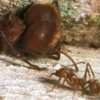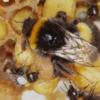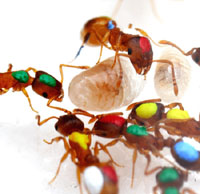|
Date
|
Topic
|
Presenter
|
Reading
|
|
Jan 11
|
Historical perspective on the study of behavior; what questions can be asked about behavior
|
Dornhaus
|
|
|
Jan 16
|
Overview of the approaches to studying behavior
(Admin: assigning topics & dates for presentations, also tipps for presentations)
|
Dornhaus
|
Krebs & Davies chapter 1 (pp1-23) & 2 (pp24-47)
|
|
Jan 18
|
Methods: comparative studies, experiments, and modelling; advantages and problems
|
Dornhaus
|
|
|
Jan 23
|
(Optimal?) foraging, economics and (biological) markets
|
Dornhaus
|
Krebs & Davies chapter 3 (pp48-76)
|
|
Jan 25
|
Predation and parasitism
|
Ming Huang
|
Krebs & Davies chapter 4 (pp77-101)
|
|
Jan 30
|
Brief overview of neurobiology
|
Dornhaus
|
Papers: Mery&Kawecki, Dunbar, Chittka et al.
|
|
Feb 1
|
How can genetics help us understand behavior? Can it?
|
Tuan Cao
|
Papers: Pinker, Robinson
|
|
Feb 6
|
'Games' ?! Interactions and strategies of behavior
|
Dornhaus
|
Krebs & Davies chapter 7 (pp147-174); paper: Nowak&Sigmund
|
|
Feb 8
|
Do animals have personalities? (Behavioral syndromes?)
|
Jenny Jandt
|
Paper: Sih et al.
|
|
Feb 13
|
Evolution of cooperation
|
Dornhaus
|
Krebs & Davies chapter 11 (pp265-290); paper: Linksvayer&Wade
|
|
Feb 15
|
Is there ever 'altruism'?
|
Laura Stein
|
Krebs & Davies chapter 12 (pp291-317) or chapter 13 (pp318-348)
|
|
Feb 20
|
Communication: mind reading and manipulation?
|
Dornhaus
|
Krebs & Davies chapter 14 (pp349-375); paper: Krebs & Dawkins
|
|
Feb 22
|
Living in groups and what is 'Sociobiology'?
|
William Fitz
|
Krebs & Davies chapter 6 (pp120-146)
|
|
Feb 27
|
Human behavioral ecology?
|
Dornhaus
|
Papers: Aiello&Dunbar, Fehr&Fischbacher, Bird et al.
|
|
Mar 1
|
What are the interesting questions in behavioral ecology today?
|
Discussion
|
Krebs & Davies chapter 15 (pp375-386); papers: Read&Clark 1, Read&Clark 2, Owens
|
|
Mar 6
|
What is cognition and how is it studied?
|
Dornhaus
|
Shettleworth chapter 1 (pp1-48)
|
|
Mar 8
|
Perception
|
Dornhaus
|
Shettleworth chapter 2 (pp49-94)
|
|
Mar 20
|
Attention - what it is and its implications
|
Discussion
|
Papers: Dukas, Spaethe et al.
|
|
Mar 22
|
Learning & Memory
|
Dornhaus
|
Paper Menzel & Giurfa OR Cheng OR Shettleworth chapter 3, 4 or 6
|
|
Mar 27
|
What is learning good for? Evolution of learning
|
Erica Sontz
|
Papers: Brown & Braithwaite, Clayton & Krebs
|
|
Mar 29
|
Orientation & Navigation
|
Dornhaus
|
Shettleworth chapter 7 (pp279-332) and Menzel et al.
|
|
Apr 3
|
Problem-solving: counting, measuring, computing
|
Keith Fligg
|
Paper: Gallistel & Gelman; optional: Shettleworth chapter 8 (pp333-378)
|
|
Apr 5
|
Do animals have abstract concepts? Does it matter? (And what does Alex the parrot tell us?)
|
Dornhaus & Discussion
|
Paper: Pepperberg; optional: Shettleworth chapter 5 (pp185-232)
|
|
Apr 10
|
Social learning & teaching
|
Dornhaus
|
Papers: Zentall, Chittka & Leadbeater, optional: Leadbeater et al. on teaching
|
|
Apr 12
|
Theory of mind, social learning, and what does it all mean?
|
Shea Cogswell
|
optional: Shettleworth chapter 10 (pp425-474)
|
|
Apr 17
|
Communication & Language: is language necessary to think?
|
Michele Lanan
|
Paper: Ackers & Slobodchikoff, optional: Shettleworth chapter 12 (pp523-565)
|
|
Apr 19
|
Tool use
|
Dornhaus & Discussion
|
Paper: Huber & Gajdon
|
|
Apr 24
|
Intentionality, making decisions, and planning for the future
|
Dornhaus
|
Papers: Schuck-Paim et al., Raby et al.
|
|
Apr 26
|
Consciousness and self-awareness, or: What is intelligence and are humans unique?
|
Discussion
|
Papers: Griffin & Speck, Plotnik et al., optional: Shettleworth chapter 11 (pp475-522)
|
|
May 1
|
Conclusions: what have we learned?
|
Discussion
|
Shettleworth chapter 13 (pp566-576)
|















